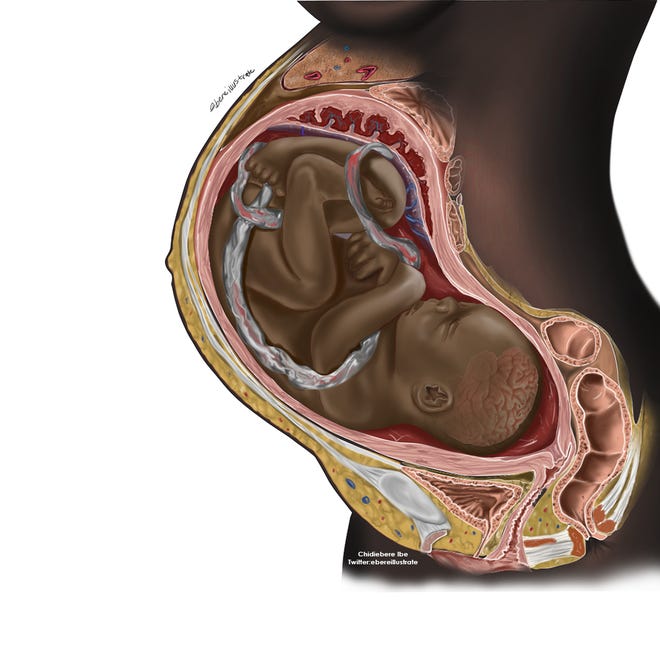Midwife-led birthing centers are a viable solution to maternity crisis

[ad_1]
- Getty Israel is a population health expert, author, writer, mother and CEO of Sisters in Birth midwifery clinic located in Jackson, Mississippi.
Since the Supreme Court ruling to overturn Roe v. Wade, I have been inundated by reporters seeking a reaction to Mississippi’s abortion ban while disregarding the State’s dismal record on birth disparities and efforts to transform its maternity healthcare system.
In 2020, Mississippi residents terminated 5,071 pregnancies, but there were 5,028 premature babies born that year. Black women accounted for over 50% of these adverse events.
Annually, they experience the highest rates of prematurity, low birth weight, cesarean (C-section) deliveries, the lowest breastfeeding rates and the highest rates of infant mortality. They are at significant risk of experiencing unnecessary medical inductions that often lead to C-section deliveries.
According to Mississippi’s Maternal Mortality Report from 2013-2016, Black women have a maternal mortality rate three times that of white women. They are more likely to die from pregnancy related disorders six weeks after birth.
Women who experience a repeat C-section delivery account for 65% of postpartum deaths.
Now that women are being forced to carry their pregnancies to term, many more will have trouble attaining timely, quality prenatal care leading to a sharp increase in maternal diseases and deaths.
Only 70% of Black women receive prenatal care during the first trimester partly because only 50% of the counties have obstetric providers. Many are driving an average of one hour to receive prenatal care. Some are giving birth in cars or dying on their way to the hospital.
Hear more Tennessee Voices: Get the weekly opinion newsletter for insightful and thought provoking columns.
Why midwifery and birth centers offer a viable solution
In 2018, the Centers for Medicare and Medicaid recommended that state leaders examine the accessibility of midwifery care and freestanding birth centers to improve birth outcomes and reduce medical costs.

Its recommendation was based on findings from the Strong Start for Mothers and Newborns study funded by the Affordable Care Act. The Study involved 45,000 racially diverse Medicaid members who primarily resided in the South.
Patients who received midwifery care in freestanding birth centers experienced substantially better prenatal care and birth outcomes, including significantly lower preterm birth rates, C-section deliveries, low birth weight babies and lower pediatric medical costs.
Patients who had experienced a previous C- section delivery had higher rates of vaginal pregnancy and were more likely to breastfeed than patients who delivered with physicians in hospitals. Midwives spent an average of 30 minutes with their patients compared to 15 minutes spent by OBs, and they collaborated with birth workers to address nonmedical risk factors.
Hear from Tennessee’s Black Voices: Get the weekly newsletter for powerful and critical thinking columns.
Our leaders don’t care about Black mothers and babies
Prior to 1950, midwives delivered nearly 90% of Black babies in Mississippi. Eventually, physicians pushed out midwives and medicalized births in hospitals.

Today, there are no birth centers and merely 24 nurse midwives; only a few may deliver babies at only three hospitals. Although my clinic provides midwifery care, patients must drive nearly two hours one way to experience a midwifery birth. One patient, accompanied by her legally blind mother, drove at night while in labor.
Mississippi’s maternity crisis continues, because our leaders don’t care about Black mothers and babies, particularly the poor and marginalized.
State and federally elected officials — white, Black, Republican and Democrat — are complicit in enabling a current system driven by expediency and profits.
They ignore midwifery, a model that is widely used around the world, as Black women experience horrible birth outcomes. U.S. Representatives Thompson, Guest and Kelly recently awarded $108.3 mil to their pet projects but nothing to maternal and child health.
Fed up with career politicians, I began the arduous journey to change the healthcare system landscape — to make a new lane, so to speak. I intend to build a midwifery-led, freestanding birth center.
I feel akin to Sam and Frodo in Lord of the Rings, but I am moved by the generous support and encouragement from individuals around the nation to keep on fighting!
Getty Israel is a population health expert, author, writer, mother and CEO of Sisters in Birth midwifery clinic located in Jackson, Mississippi.
[ad_2]
Source link
